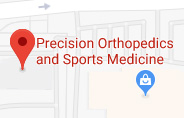Arthroscopic Wrist Surgery
Wrist is also called as carpus, a complex joint comprised of bones and joints, ligaments and tendons, nerves, blood vessels, and muscles that hold the bones together. A fibrous cartilage present between the radius and ulna (forearm bones of the hand) separates the radioulnar joint from the rest of the wrist. Wrist connects the forearm to the hand and allows it to move. Carpal tunnel is an opening in the wrist through which the nerves and blood vessels pass.
Some of the common problems of the wrist which can be treated by arthroscopy include carpal tunnel syndrome (the nerves in the carpal tunnel are compressed), arthritis, bone fractures, dislocations, inflamed tendons and ligaments, ganglion cysts, chronic wrist pain
Arthroscopy is a minimally invasive procedure that allows your surgeon to look inside the wrist joint using small incisions (portals) and instruments. Wrist arthroscopy allows the surgeon to diagnose and treat the disorders of the wrist. Your surgeon makes several incisions near your wrist joint. Through one of the incision, an arthroscope, having a small camera fixed to the end of a narrow fiber-optic tube which is inserted. The camera magnifies and projects images of the wrist on a large screen monitor which helps in diagnosing the condition. Through the other incisions surgical instruments are inserted to treat the problem of the wrist. A sterile solution is injected into the wrist to expand the joint that allows clear view of the joint and provides extra room for the procedure. After the surgery the stitches are closed and dressing is applied.
After the surgery, your surgeon will place a cast or a splint that immobilizes that will prevent the movement of the wrist until it is healed completely. The operated wrist should be elevated to prevent excessive swelling and pain. Ice (wrapped over a cloth) can be applied over the operated area which helps to reduce swelling and medications are taken to reduce pain. Always remember to keep the operated area clean and dry to prevent infection and pus formation.
Some of the advantages of arthroscopy are smaller incisions, minimal soft tissue trauma, less pain, faster recovery time, low infection rate, less scarring, earlier mobilization, and allows patient to go home the same day.
Some of the risks observed after wrist arthroscopy include infection, damage to the nearby nerves or tissues during surgery, and stiffness which can be treated through post-operative rehabilitation. Exercises are performed to strengthen the wrist and rebuild your strength.
2120 N. MacArthur Blvd
Suite 100
Irving, TX 75061
 Ph: (972) 438 4636
Ph: (972) 438 4636
 Fax:
(972) 438 2077
Fax:
(972) 438 2077

 Make an Appointment Online
Make an Appointment Online

 Shoulder
Shoulder Elbow
Elbow Wrist
Wrist Hand
Hand Patient Education
Patient Education Testimonials
Testimonials Map
& Location
Map
& Location Patient Forms
Patient Forms






